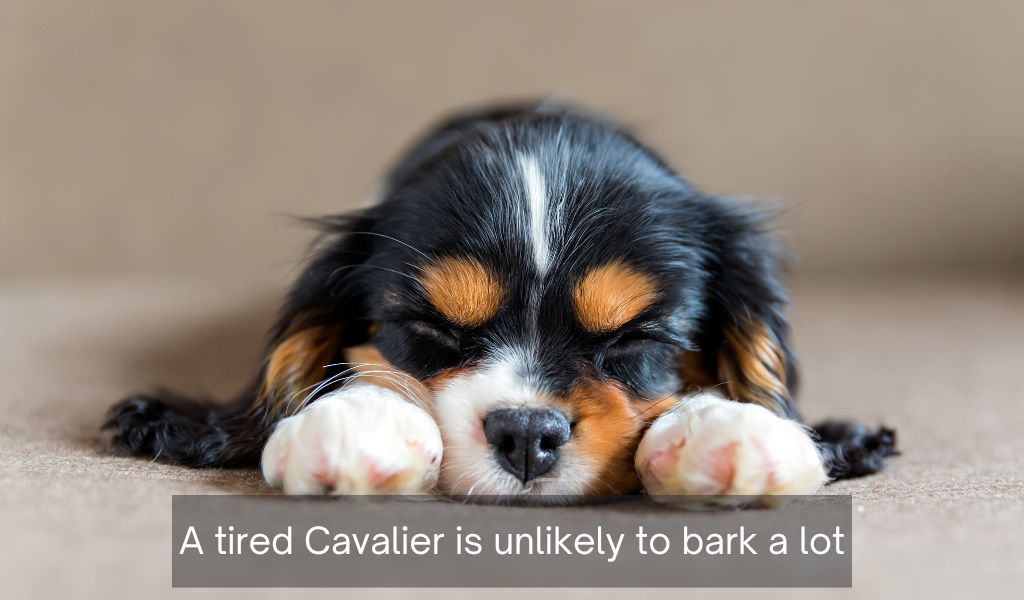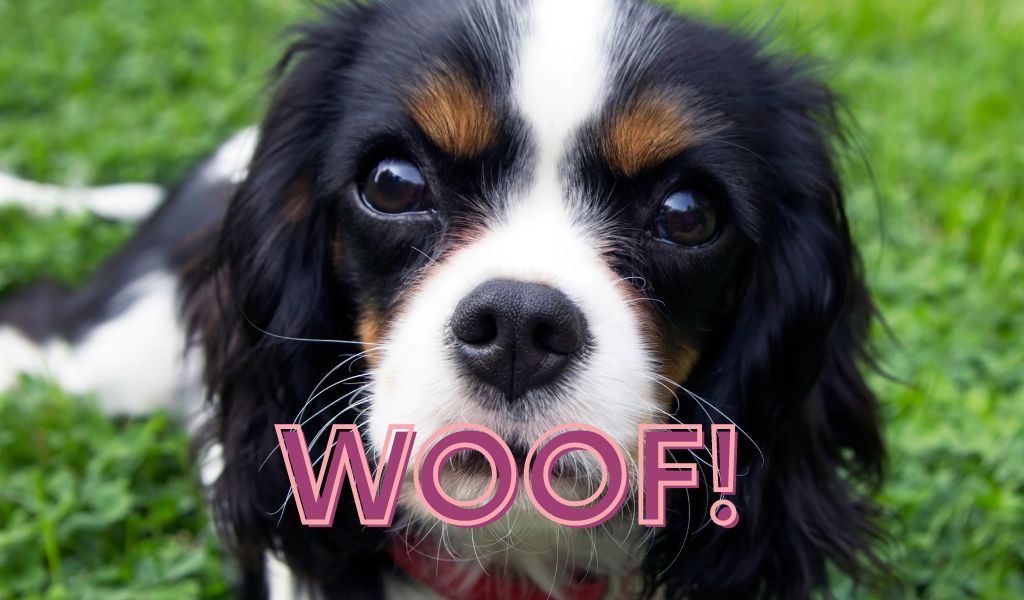If you’re considering a Cavalier King Charles spaniel then you’ll be looking at the various qualities and behaviours of the breed and one concern may be that of how much do they bark?
The answer is, it depends on the individual dog. Some cavaliers may only bark when they hear a noise that surprises them, while others may be more vocal and bark frequently.
Why do Cavalier King Charles spaniels bark?
Barking is a natural behaviour for a Cavalier and dogs will bark for a variety of reasons.
Some of these may include attention seeking, boredom, alerting their owners to something they find interesting or alarming and even as a form of communication with other dogs.
Barking can also be a sign of anxiety or fear or an underlying medical issue, so it’s important to take note of the context and frequency of your Cavalier’s barking.
Cavaliers are also notorious for being food motivated. If they think that there is even the slightest chance that someone might have a treat then they’ll often start barking in the hope of getting a snack.
It’s also important to remember that every dog is different and some may bark more than others.
The most important thing is to identify what your dog is barking at, so that you can address the behaviour and work towards a solution.
If your Cavalier is barking excessively, it’s best to seek professional help from a qualified trainer or your vet who can assess the underlying cause of the problem.
Cavaliers will often bark if they are disturbed by noises or visitors to the house and often when they want something – such as food.
How much is too much barking?
Like all dogs, Cavalier King Charles Spaniels bark as part of their natural communication.
However, some Cavaliers may bark more frequently or loudly than others.
While there is no set amount of barking that is considered too much, it is generally advisable to keep your dog’s barking to a minimum.
Excessive barking can be disruptive and annoying to those around you, and if your dog barks excessively it could land you in trouble with the authorities.
If your dog is finding it difficult to settle down or is consistently barking for long periods of time, it may be worth seeking professional help from your vet who may be able to prescribe treatment to help your dog to settle down.

What are some tips to help stop your Cavalier King Charles spaniel from barking excessively?
There are a few things you can do to help stop your Cavalier from barking excessively.
First, try to figure out what is causing your dog to bark. Is he barking out of excitement, fear, boredom, or something else?
Once you know the reason behind the barking, you can start to address the problem.
For example, if your dog is barking out of boredom, make sure to provide him with plenty of toys and exercise. A tired dog is less likely to have the energy to bark excessively and will simply go to sleep and rest.
If your dog is afraid of something, try desensitizing him to it gradually.
Whatever the reason for the excessive barking, there are likely ways to help stop it. With a little patience and effort, you can help your Cavalier King Charles Spaniel learn to bark only when necessary.
If your Cavalier appears to be unwell or is displaying signs of anxiety ( panting and pacing around being two indications ) then arrange to take him to the vet for a check up.
Also, be consistent with your commands and rewards; if your dog knows that he will be rewarded for quiet behaviour, he is more likely to offer it more often.
How do you know if your dog is barking out of boredom or anxiety and what can you do about it if it is the latter case?”
Unfortunately, there is no sure-fire way to know for sure why your dog is barking.
If your Cavalier is barking when there’s nothing going on or he is barking at you, then the chances are that he is bored and you need to wear him out with a good walk.
On the other hand, if your dog is barking when there’s something clearly upsetting it then this could be a sign of anxiety.
This could be barking when you leave the house or during changes in routine and, if this barking is accompanied by other signs of anxiety such as panting and pacing around, then you may need to consult your vet to help you to calm your dog down.
You should also consider how often your Cavalier is barking. If it’s only occasionally and not excessively then, the chances are, he’s simply bored.
However if he barks regularly and seems to get himself worked up then he may be experiencing anxiety.
Of course, only your vet can give you a more definitive answer, but these are general guidelines to keep in mind.
Are there any other ways to help reduce your Cavalier King Charles spaniel’s barking?
Training and behavioural modification therapy are two possible solutions.
With training, you can teach your dog to bark only when necessary, such as when someone is at the door.
Behavioural modification therapy can also help to change your dog’s behaviour by teaching them how to respond to different stimuli in a positive way.
For example, if your dog starts to bark excessively when they see another dog, you can work with them to help them to learn to respond calmly instead.
FAQs
Do Cavalier King Charles Spaniels have a tendency to bark excessively?
Cavalier King Charles Spaniels are generally known for being friendly and affectionate dogs. While they may bark occasionally to alert their owners or in response to stimuli, they are not typically considered excessive barkers. However, like any dog breed, individual personalities can vary, and some Cavaliers may be more prone to barking than others. It’s important to provide proper training and socialization to ensure they understand appropriate behaviour and reduce any potential barking issues.
What are the common reasons why Cavalier King Charles Spaniels may bark?
Cavalier King Charles Spaniels may bark for various reasons, just like any other dog breed. Some common triggers for their barking include territorial instincts, perceived threats, boredom, loneliness, or seeking attention. It’s crucial to understand the underlying cause of their barking to address it effectively. Identifying and addressing any potential triggers, providing mental and physical stimulation, and engaging in regular exercise can help minimize excessive barking tendencies in Cavaliers.
How can I reduce excessive barking in my Cavalier King Charles Spaniel?
If you find that your Cavalier King Charles Spaniel is barking excessively, there are several strategies you can employ to address the behaviour. Start by identifying the root cause of the barking, whether it’s a need for attention, boredom, or anxiety. Addressing those underlying issues through proper training, socialisation, mental and physical stimulation, and providing a consistent routine can help reduce excessive barking. Additionally, rewarding desired behaviour, using positive reinforcement techniques, and seeking professional guidance, if necessary, can further assist in curbing excessive barking tendencies in Cavaliers.
Final Words
Cavalier King Charles spaniels bark and, like all dogs, there are times when this barking may seem to be excessive.
However, with the right care and by understanding why your dog is barking, you should be able to help stop the problem and keep your dog happy.




